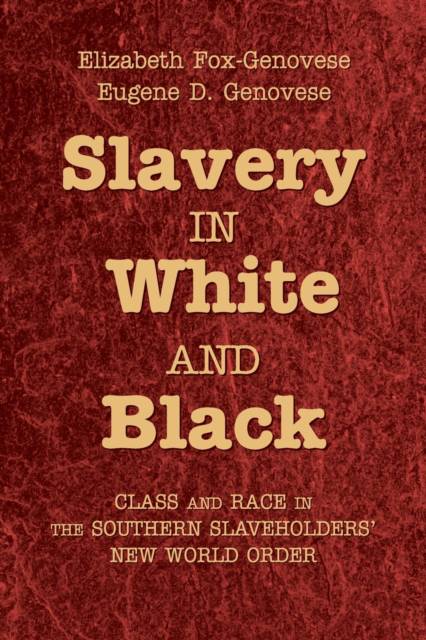
- Afhalen na 1 uur in een winkel met voorraad
- Gratis thuislevering in België vanaf € 30
- Ruim aanbod met 7 miljoen producten
- Afhalen na 1 uur in een winkel met voorraad
- Gratis thuislevering in België vanaf € 30
- Ruim aanbod met 7 miljoen producten
Zoeken
Slavery in White and Black
Class and Race in the Southern Slaveholders' New World Order
Elizabeth Fox-Genovese, Eugene D Genovese
Paperback | Engels
€ 50,45
+ 100 punten
Uitvoering
Omschrijving
Southern slaveholders proudly pronounced themselves orthodox Christians, who accepted responsibility for the welfare of the people who worked for them. They proclaimed that their slaves enjoyed a better and more secure life than any laboring class in the world. Now, did it not follow that the lives of laborers of all races across the world would be immeasurably improved by their enslavement? In the Old South but in no other slave society a doctrine emerged among leading clergymen, politicians, and intellectuals-- "Slavery in the Abstract," which declared enslavement the best possible condition for all labor regardless of race. They joined the Socialists, whom they studied, in believing that the free-labor system, wracked by worsening class warfare, was collapsing. A vital question: to what extent did the people of the several social classes of the South accept so extreme a doctrine? That question lies at the heart of this book.
Specificaties
Betrokkenen
- Auteur(s):
- Uitgeverij:
Inhoud
- Aantal bladzijden:
- 332
- Taal:
- Engels
Eigenschappen
- Productcode (EAN):
- 9780521721813
- Verschijningsdatum:
- 27/10/2008
- Uitvoering:
- Paperback
- Formaat:
- Trade paperback (VS)
- Afmetingen:
- 155 mm x 234 mm
- Gewicht:
- 566 g

Alleen bij Standaard Boekhandel
+ 100 punten op je klantenkaart van Standaard Boekhandel
Beoordelingen
We publiceren alleen reviews die voldoen aan de voorwaarden voor reviews. Bekijk onze voorwaarden voor reviews.











